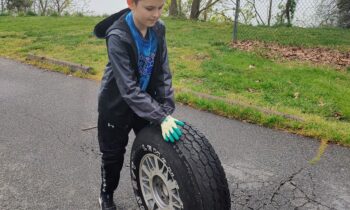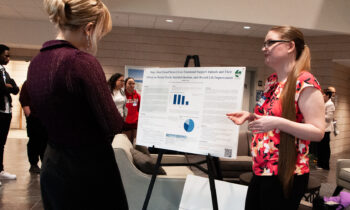
Grant aligns with National Recovery Month and its efforts to increase awareness and understanding of mental and substance use disorders
Overdose prevention efforts in Harford County will be greatly enhanced thanks to a grant from Maryland’s Opioid Operational Command Center of $181,500. The grant will provide for additional peer recovery support personnel at University of Maryland Harford Memorial Hospital (UM HMH), Maryland’s Opioid Operational Command Center (UM UCMC), and The Klein Family Harford Crisis Center (KFHCC).
The Behavioral Health program at UM HMH in Havre de Grace has been serving the community for close to 30 years. The KFHCC, located in Bel Air, is in its second year as a public-private organization with the University of Maryland Upper Chesapeake Health and aims to address mental health and substance use in Harford County. It serves adults 18 and over—as well as provides assessments and referrals for children—who are suffering from mental health and/or substance use disorders. To date, the KFHCC has served over 3,100 people for urgent care, over 2,600 guests for outpatient appointments and over 450 residents for overnight stays. Harford County saw a 173 percent increase in opioid-related deaths from 2013 to 2017, and similar statistics are found in counties across Maryland. Peer recovery specialists provide peer-to-peer support to others who have opioid or other substance use, behavioral health, or co-occurring disorders. They draw from their personal experiences and journeys of recovery to provide hope and care to others in similar situations.
Through June 30, 2020, funding for the UM UCH and KFHCC peer recovery specialists was provided through a multi-year commitment from various community partners. With funding from this state grant and The Upper Chesapeake Health Foundation, the KFHCC can continue to provide eight peer recovery support personnel around the clock to assist in screening, intervention and links to treatment.
National Recovery Month, taking place throughout the month of September, recognizes the efforts of peer recovery specialists. This year’s theme, “Join the Voices for Recovery: Celebrating Connections,” reminds us that recovery from addiction is possible and support is crucial. The KFHCC has witnessed how peer recovery support makes the difference between a lifetime of struggle and recovery. To show its support of Recovery Month, UM UCH will launch several podcasts in September highlighting the role of peer recovery specialists and some of their experiences.
“Peer recovery is an important service for people struggling with addiction issues. Engagement, education and support make a world of difference to people as they make the necessary changes to recover from substance use disorders,” said Jennifer Redding, LCSW-C, Director of Behavioral Health – Outpatient Services for UM UCH.
Linda Schneider, a peer recovery coach with UM UCH and KFHCC, takes pride in her ability to help individuals navigate treatment, develop recovery plan, and provide mentorship. “I work with some patients for many months to ensure they are putting their best foot forward and reaching their goals. As a person in long-term recovery, it warms my heart to see these struggling individuals progress in their recovery and lead happy, productive lives,” she said.
Take, for example, the story of Michael (real name omitted), a Harford County man whose coworkers brought him to the KFHCC after finding him disoriented and seemingly under the influence of heroin while at work. Not only did crisis team members stabilize and assess Michael’s treatment needs, but they also connected him to treatment resources and a peer recovery specialist. When he arrived at the KFHCC, Michael had been experiencing a number of stressors in his life, including heartbreak and the threat of losing his job. His peer recovery specialist, in recovery from her own addiction struggles, was able to relate to Michael’s issues and share with him her own recovery experience. Today, Michael has been clean for nearly a year.
“During these times, the COVID-19 pandemic has increased unemployment and other major uncertainties, leading to extensive stress and isolation,” said Richard Lewis, MD, Chair, Department of Psychiatry, Medical Director, Behavioral Health Regional Collaboration, UM UCH. “Unfortunately, it has also contributed to a 5.8 percent increase in fatal overdoses in Maryland. This grant will significantly assist both UM UCH and KFHCC in their peer recovery outreach.”
Mohan Suntha, MD, MBA, President and CEO of the University of Maryland Medical System continues: “We are very appreciative of this grant funding from the state, which will provide much-needed assistance to our clinical experts on the frontlines and coalition partners working with vulnerable and at-risk populations on overdose prevention efforts in Harford County.”
About the Klein Family Harford Crisis Center
The Klein Family Harford Crisis Center (harfordcrisiscenter.org) is a public-private organization with the University of Maryland Upper Chesapeake Health intended to address mental health and addiction in Harford County. The Center provides a 24/7 crisis hotline and mobile crisis team, a walk-in urgent care clinic, scheduled outpatient services and short-stay residential services for adult guests requiring an extended period of concentrated care. It all starts with a call to 1-800-NEXT-STEP for 24/7 immediate assistance.
About University of Maryland Upper Chesapeake Health
University of Maryland Upper Chesapeake Health includes the University of Maryland Upper Chesapeake Medical Center and the Patricia D. and M. Scot Kaufman Cancer Center on its Bel Air campus, the Klein Family Harford Crisis Center in Bel Air offering services for behavioral health, and the Senator Bob Hooper House in Forest Hill, an assisted living facility that specializes in hospice. The University of Maryland Harford Memorial Hospital has been operating in the community for over a century and is located in Havre de Grace. The leading health care system and largest private employer in Harford County, UM Upper Chesapeake Health offers a broad range of health care services, specialty care, technology and facilities to the residents of northeastern Maryland.



